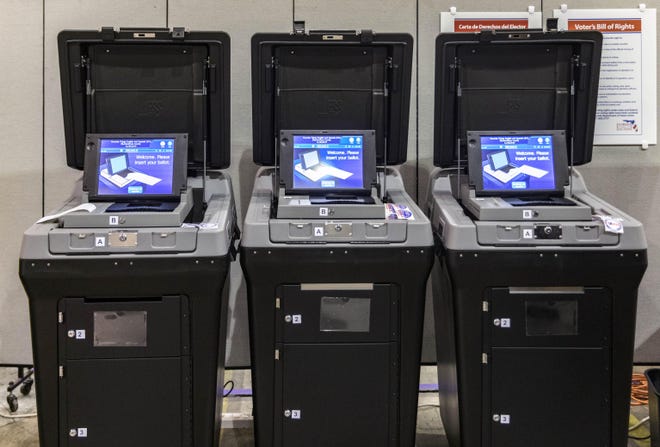Some elections observers just can’t be convinced
This year, as the Palm Beach County Supervisor of Elections was publicly testing ballot counting machines, one observer grew so animated in her questioning of the process that she had to be removed by sheriff’s deputies. The same thing was true, perhaps to a lesser degree, in Pinellas County several days later. In reaction, the canvassing boards of both counties joined Collier County in deciding that they would no longer accept questions from observers during the testing but only afterward. And that’s a shame.
To give you some context: supervisors of elections are required to do “logic and accuracy” tests to assure that their ballot-counting equipment is working properly. This happens before every election, and you can observe it. Canvassing boards — composed of a judge, a county commissioner, and the SOE — oversee the testing, as they do the tabulation of votes and “curing” of provisional ballots.
More on voting:Supervisor of Elections wants 53% budget increase; cites new state laws, 2024 election
I work with a group that observes this process and tries to make sure that every eligible voter who is registered gets to cast a ballot that is counted. Over the past few election cycles, groups different from mine observing the equipment tests, the signature matching for vote-by-mail ballots, the determinations of voter intent for peculiarly marked ballots, the duplication of torn or otherwise spoiled ballots, and so on, seem to have grown increasingly hostile, convinced something nefarious is going on.

That their ire is directed to the machines, the supervisors, their staffs and the canvassing boards is in one sense understandable. After all, if you remain convinced, as apparently 70% of Republicans do, that the last presidential election was “rigged,” and if you are aware that court case after court case fails to show this, then the source of the rigging must be deeply hidden from view. And where better than in the machines or in the processes and procedures of our supervisors, their staffs and canvassing boards?
More on elections‘Election integrity,’ an unfunded mandate for local communities | Editorial
So as the court cases go belly up and as Mike Lindell has to pay $5 million over his phony “proof” of Chinese hacking, our neighbors have turned their attention to the nitty gritty of logic and accuracy tests of the machines, the signature matches and so on. That’s where they’re apt to hit pay dirt. And because they already assume something is amiss, they are not in a good mood.
I thought one way to improve their mood would be to have them go through training to be poll workers and then work for the supervisor of elections. (Really readers, you all should!) That way, they could see the elaborate care that is taken to make elections secure, and to ensure that hacking of the voting machines does not occur. But my wife’s experience as a poll worker on March 19 indicates how naïve I was.
She reports that half her fellow Republican poll workers were election deniers, arguing, for instance, that Kari Lake won in Arizona. Her precinct supervisor believed Trump won every close state he lost and that the judges ruling otherwise were corrupt. Most astonishingly, the operator of the DS200 — that’s the machine that counts the ballots— incorrectly informed her that she had been told in her training that the machine could be hacked. When a voter skeptically asked the operator why the back panel of the machine was open and said she had heard a thumb drive could be inserted there to alter the results, the operator did not explain that the panel had to be open to allow the power cord to come out and that there was no USB port.
So going through training on the machines and all the elaborate double-checking of ballots and securing them and then checking again doesn’t quell some poll workers’ doubts. Apparently, the rage against the machines will only end when the “right” people always win, and that’s something that’s hard to achieve in a democracy.

Mark Schneider is a resident of Boynton Beach. Professor Kevin Wagner’s Civics Project column will return to this space next week.
This article has been archived for your research. The original version from Palm Beach Post can be found here.
